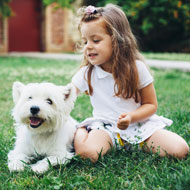Pet-owning households rise by 600,000

Households with both children and dogs now number 2.3 million - an upswing of 11 per cent.
The number of pet-owning households in the UK has risen by 600,000 this year, according to new figures from the Pet Food Manufacturers’ Association (PFMA).
Based on interviews with 8,000 households, PFMA estimates that nearly half of UK households now own a pet (45 per cent), equating to a total of 13 million households.
Over a quarter (26 per cent) own a dog, which is 300,000 more than the previous survey and brings the UK dog population up to nine million.
It is appears that the rise in dog ownership is driven by families, as households with both children and dogs now number 2.3 million - an upswing of 11 per cent.
Dogs Trust veterinary director Paula Boyden said: “We have long known that dogs are man’s best friend and it is positive to see an increase in the number of households with children also sharing their lives with dogs.
“Owning a dog can have so many benefits for families and our hugely successful Be Dog Smart campaign is packed full of advice and information to ensure this harmonious relationship continues.”
Cats have also seen a spike in popularity, with eight million now being kept as pets - the highest level in five years. Nearly a fifth (18 per cent) of households own a cat, the figures suggest.
The top 10 pets are:
- Dogs - nine million
- Cats - eight million
- Rabbits - 900,000
- Indoor birds - 500,000
- Domestic fowl - 500,000
- Guinea pigs - 400,000
- Hamsters - 300,000
- Tortoises and turtles - 300,000
- Lizards - 200,000
- Snakes - 200,000



 The Animal and Plant Health Agency (APHA) has updated its online reporting service for dead wild birds.
The Animal and Plant Health Agency (APHA) has updated its online reporting service for dead wild birds.